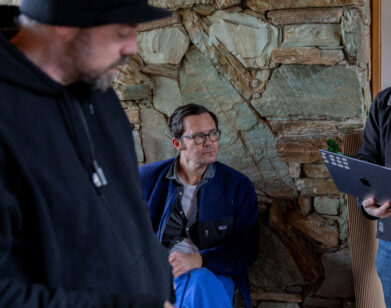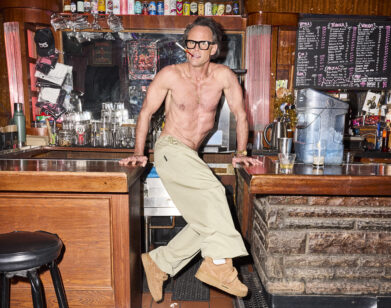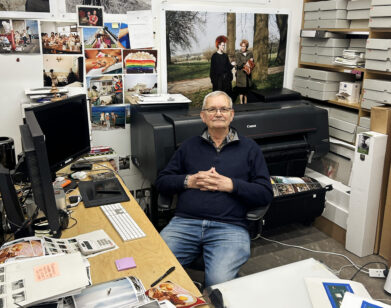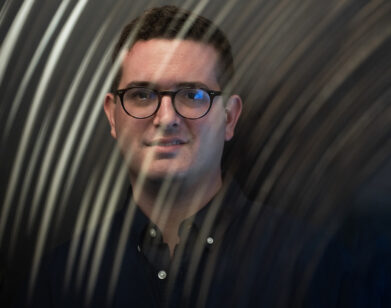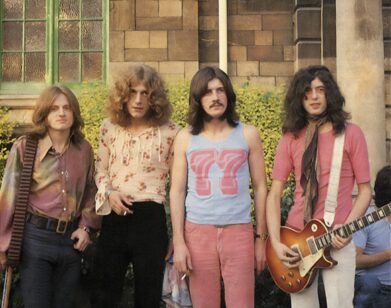LEGENDS
Geraldine Chaplin Has Seen Death at Every Corner
If you ask anyone who’s seen even one of Geraldine Chaplin’s 150-plus films, they’ll agree she was destined for fame. Starting off as the little girl in the opening scene of her father Charlie Chaplin’s film Limelight, and earning a Golden Globe nomination with her first English-language role as Tonya in David Lean’s Doctor Zhivago, Chaplin’s career has been a rich and adventurous mosaic, to say the least. Meeting Geraldine at a showcase of Bulgarian films was an unlikely event. What brought us together was the UK premiere of her last feature, The Barefoot Emperor, the “unconventional sequel” to 2016’s The King of the Belgians and a biting parody of Europe’s political present, where she plays twins who could not be more different. How does one approach an icon like Geraldine Chaplin? Turns out, it was rather easy, because she did it first, asking about the bleached bit in my hair. Suddenly, one hour had passed and we’d covered a range of topics, from her disciplinarian father and the rigor of ballet training to Europe’s geopolitical crisis and even mortality itself.—SAVINA PETKOVA
———
SAVINA PETKOVA: You’ve been working for so long. And I can imagine you’ve been doing interviews for as long as you’ve been acting. Do you like doing interviews?
GERALDINE CHAPLIN: I don’t! It’s not that I particularly like doing them. But you learn about other people. Like, I just learned about your hair.
PETKOVA: Yeah, but that’s only because you asked. You seem like a curious person.
CHAPLIN: No, that’s true. I like people. I think that’s important.
PETKOVA: You grew up training to be a ballerina, and then you became an actress. Both require incredible discipline. And your father was famous for his work ethic and discipline.
CHAPLIN: Yes, he was very strict. He was Victorian. And he was of the Victorian generation and had all the, I would say “defects,” of that time, but maybe they’ve certainly helped me. I mean, his discipline helped me. I remember it was always: “Daddy’s working!” We weren’t allowed to make noise, which for us children was very difficult. But he was a good example of discipline. And then I was a ballet dancer, and that’s all about discipline, and turning your body into some crazy unnatural thing. And then I became an actress, and I found that all that discipline really helped me.
PETKOVA: But you seem to approach life playfully. Does that extend to your work?
CHAPLIN: No, no, no, no. I take my work so seriously. And just slog away, slog away, and try to get the nuances, try and get as close to the truth of the character I’m playing as I can. At one point, I was cleaning up and getting rid of things in Madrid and I threw away all my scripts. I’d kept them all, I don’t know why. And then someone said, “Don’t throw away your scripts! We want them for archival purposes!” And I said, “No, I don’t! I’m gonna throw them away.” It’s because I’ve left bits of myself there, as part of them. I mean, I’ve played so many characters, I don’t know, in 200 films or something, and every one of the scripts is lined and I have notes and I don’t want anyone else to see that.
PETKOVA: Do you think vulnerability is an important part of acting well?
CHAPLIN: I don’t really think about it, but I do. I am a very vulnerable person. I mean, try insulting me. I’d feel so hurt. It sometimes gets in the way of work. But, you know, if you are vulnerable and become an actress, then you use it?
PETKOVA: In what way?
CHAPLIN: Well, it’s memory. Memories of being hurt and being vulnerable in front of others. I mean, I know I’m vulnerable, I know that. So I guess if you know it… I don’t think I use it. But maybe I do.
PETKOVA: I guess these processes are unconscious, but do you think acting gave you some sort of coping mechanism?
CHAPLIN: It was mostly, I think, the example of my father’s discipline, the discipline of ballet dancing. And because of that, you can suddenly say, “Okay, today’s finished, yeah. I’m no longer this person. Now, I’m another person. Was there ever that person in the first place?
PETKOVA: Was there a character where this was more difficult?
CHAPLIN: I think lately, yeah, because my memory isn’t too good. But I think lately, when I was in The Crown, it happened for the first time. My [character’s] husband was dying. And I wasn’t acting. I had to come into the room crying, and I thought, “God, he’s dying. He’s dying.” And I really got myself into the part. And then at the end of the day, it was a bit more difficult than usual. Because usually I act. I remember the director said, “The dog jumps off the bed, and so you know that he’s dead.” Because the dog wouldn’t stay with the dead body. So as I was preparing for it, I thought, “Oh, God, this is it!” I for once put myself in the part fully. I’ve never done that before. I’ve always done it differently like, if I have to cry, I put my fingers in my eyes, the tears come, and then they’re there. The emotion comes afterwards.
PETKOVA: So all of this caught you off guard?
CHAPLIN: Yes, yes, and I prepared for it so hard! You know, I remember being behind the door thinking, “Oh, God, he’s dying, he’s dying, your husband has died!” And being close to death myself, I mean, I’m getting older and no one lasts forever. It just was so sad. And it did invade me in a funny way, but that’s the only time that I can remember. Maybe there are other times that I don’t remember because they’re too far back.
PETKOVA: I’ve always had a really bad memory, but lately I’ve been telling myself that memory has a way of looking out for us, too. Forgetting as a therapeutic practice.
CHAPLIN: I’m so glad you think that! Yes, it is. And as you grow older, you lose your memory. I just hope that I’ll remember lines [laughs]. I have a film now, which is a musical comedy, but it’s about assisted suicide. I don’t know if I can remember it, I don’t know if I can do it. You know, it’s really so hard. We rehearsed for three months, just inventing the script as we went along. It was great. And then I started reading it and I can’t get to the end. I mean, I burst up, because it’s all emotional. It’s so good, but it’s so close to me.
PETKOVA: Have you shot it already?
CHAPLIN: No, it’s the next one.
PETKOVA: Is it set in Switzerland, where you also live?
CHAPLIN: Well, there’s Spain, there’s Switzerland for the dying bit. I think it [assisted suicide] is allowed in Spain now.
PETKOVA: Do you feel like death informs your sensitivity as a person and an actress?
CHAPLIN: I have seen death at every corner. Since I was 50. I see death just waiting for me, hungry. And so every morning I wake up and I go, “Oh. Still here for the moment!” [Pinches herself]. I feel like the flowers die and then they come up again in the spring. And I’m not going to come up in the spring. And death is something that I see everywhere now.
PETKOVA: Has cinema helped you deal with this at all?
CHAPLIN: Not really. I mean, I’ve died so many times. [Laughs] It just means if you go, if you’re drowning yourself, you hold your breath as long as you can and make everyone scared. “Oh, god, she’s not going to come out!” But no, it’s not. It’s more personal. I mean, one gets old, my back aches, but I try to keep in shape. I walk eight kilometers every day, mostly uphill, and you do what you can to fight it, because it’s there. It’s waiting. It’s hungry. The lady that comes and takes us away without permission.
PETKOVA: But the films you’ve made will exist forever.
CHAPLIN: No, no, that’s true in very few cases. But I mean, I think my father is always here. But thank god he’s not really here [Laughs]. But I don’t think of myself being immortal. The films will always exist.
PETKOVA: You grew up bilingual. Do you express yourself differently in different languages?
CHAPLIN: I’m told I sound completely different in French than in English. Well, in Spanish I have a little accent. But in French, the voice changes, it becomes a sort of French voice. I remember one director [Arnaud des Pallières] in a movie called Parc, where I played the mother of Jean-Marc Barr, who is lovely. The scene was him coming to visit me in an old lady’s home. And suddenly the director said, “Try it in English!” So we did and it was completely different. I even acted in German once!
PETKOVA: That’s interesting because you didn’t actually speak it in The Barefoot Emperor, the film we saw last night. You said it was dubbed over your role.
CHAPLIN: I can’t speak German, even if I learned it in school. I was at a nun school, at a Catholic school. And there was only one male teacher, the German teacher. We would write all the verbs and conjugations on our legs, and he would order us to stand up thinking that cheating papers would fall out. But he couldn’t ask us to lift up our skirts because there was always a nun in the classroom. So that’s my German. But I think if I went to Germany for six months, I could speak it.
PETKOVA: So, how was playing a particularly German lady in the Barefoot Emperor?
CHAPLIN: Well, I tried it, and I couldn’t. And I said, “No, it has to be another person.” So it’s another voice. But it’s the girl who dubs me in every film that I’ve ever done in Germany. She said, “Oh, Geraldine, I’ve done her a million times.” So the voice is similar.
PETKOVA: You’ve already shot a film with Jessica Woodworth called Luka. How did you two meet?
CHAPLIN: She sent me a film, which was King of the Belgians, and I saw it and laughed myself silly. It’s the kind of humor that I really love. I knew immediately that I wanted to work with her. I think she sent me King of the Belgians because she already wanted me to play a part in the second film. A lot of film directors send their films, but I was crying with laughter at this.
PETKOVA: And then you stepped into the second part of the film, which is not as straightforwardly comedic as the first one.
CHAPLIN: It was a very different film. And I was playing this crazy lady [Miss Liz] who thought she had a twin [Agatha] but she didn’t. And then it turned out at the end, she did have one! There was a German actress who was supposed to play Agatha but she couldn’t make it so I stepped in. I found it interesting, this example of people who are brought up differently. One of them was brought up in a concentration camp while the other one ended up with a rich Nazi family. And it’s funny, because sometimes twins, they name their children the same name when they’re separated identical twins.
PETKOVA: I couldn’t help but think that the twin characters that you play are an allegory for Europe’s two faces.
CHAPLIN: That was the intent!
PETKOVA: Do you consider yourself European?
CHAPLIN: Yes! Well, I’m a Brit. Yeah, I have an English passport. When my father was thrown out of the United States [in 1952, Chaplin’s re-entry permit was revoked], he threw away his children’s passports and changed them all to British passports. My mother actually gave up, she went to the embassy and renounced her American citizenship. But my father just said, “No, the children are British!” But Europe, yes, Europe. God, it’s so scary. I mean to say that Jessica is a total visionary, because The Barefoot Emperor was shot even before Europe became as messy as it is now. When we suddenly came off the island [Brijuni Island, Yugoslav president Tito’s Island] after we were playing these roles, everything was happening in reality. It caught up. Bolsonaro suddenly appeared. And now Italy.
PETKOVA: Is a sense of belonging important to you?
CHAPLIN: I hate anything to do with borders, flags. All that stuff that’s in the film. I mean, I really hate it. I hate it profoundly. I mean, we’re human beings and all the nations are one nation. I used to think, you know, if some martian comes or some extra terrestrial creature, then we’ll all be together because there’s a common enemy. But I don’t even think that anymore. Because look at climate change. No one gives a shit. My father did The Great Dictator after all.
PETKOVA: It’s better to identify as human.
CHAPLIN: Yes, and we’re getting less and less of that. It’s kind of depressing.
PETKOVA: Hopefully, the work you’re doing is a force against that.
CHAPLIN: That’s exactly right. It’s the only thing we’re going to leave when we’re all gone.


